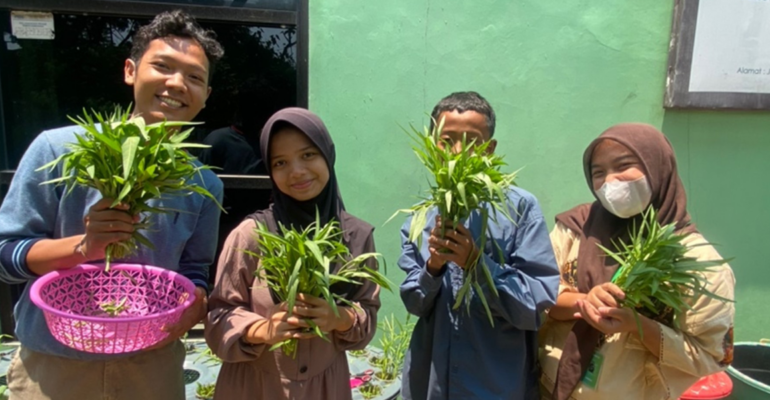IPB University FarmWise Team Initiates Urban Farming Program at Kunci Bahagia Orphanage

Many orphanages only provide basic services such as food, sleep and formal education, with minimal self-development activities. According to IPB University’s Student Creativity Program for Community Service (PKM-PM) team, this condition can result in orphanage children lacking opportunities to develop their potential and improve their quality of life.
The same thing happened at Kunci Bahagia Orphanage, Leuwiliang, Bogor Regency, West Java. The PKM-PM FarmWise IPB University team found that there were no activities that developed the potential of the children there. For this reason, they initiated urban farming activities at Kunci Bahagia Orphanage with the concept of improving the quality of life and entrepreneurial spirit using the games based learning method.
“The urban farming program includes the implementation of fish cultivation activities in buckets (budikdamber) combined with kale planting, terrarium making training, and kokedama making. It is expected that from the implementation of this program, the products produced can benefit the children of the orphanage,” explained Rana, one of the members of the FarmWise IPB University PKM-PM team.
She said that the terrariums and kokedama that have been made can be sold through various platforms, one of which is online. Meanwhile, the kale and catfish that have been harvested from the budikdamber can be sold and consumed by the children of the Kunci Bahagia Orphanage. In addition, the harvested catfish can be processed into various kinds of products, such as catfish crackers and other products.
“We initiated this urban farming program with the hope that the foster children at Kunci Bahagia Orphanage will have an interest in continuing this program. Hopefully, in the future, it has the potential to become part of the orphanage curriculum so that it can increase income and food needs, and become an example for other orphanages,” she said. (*/Rz) (IAAS/ANF)



